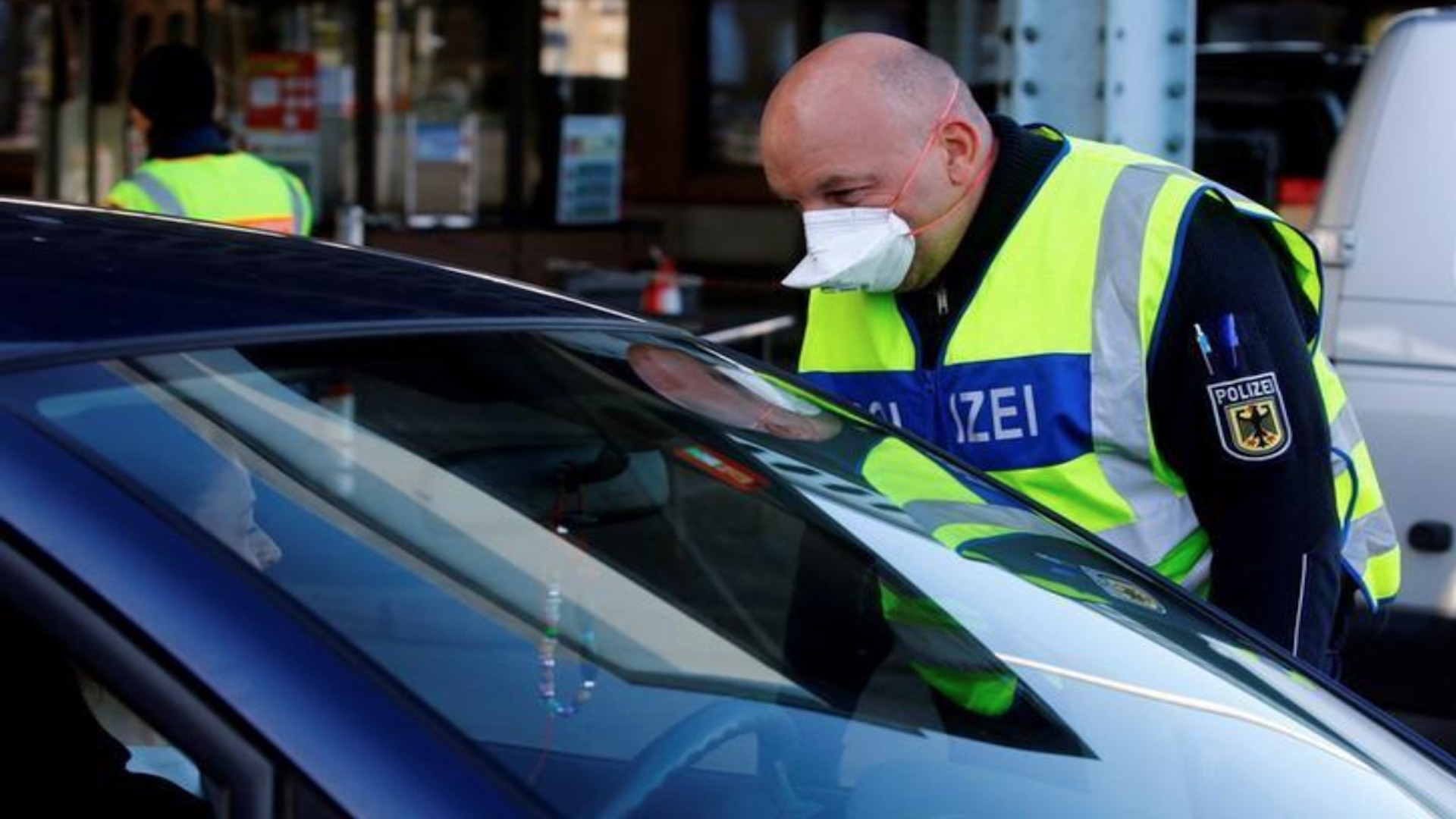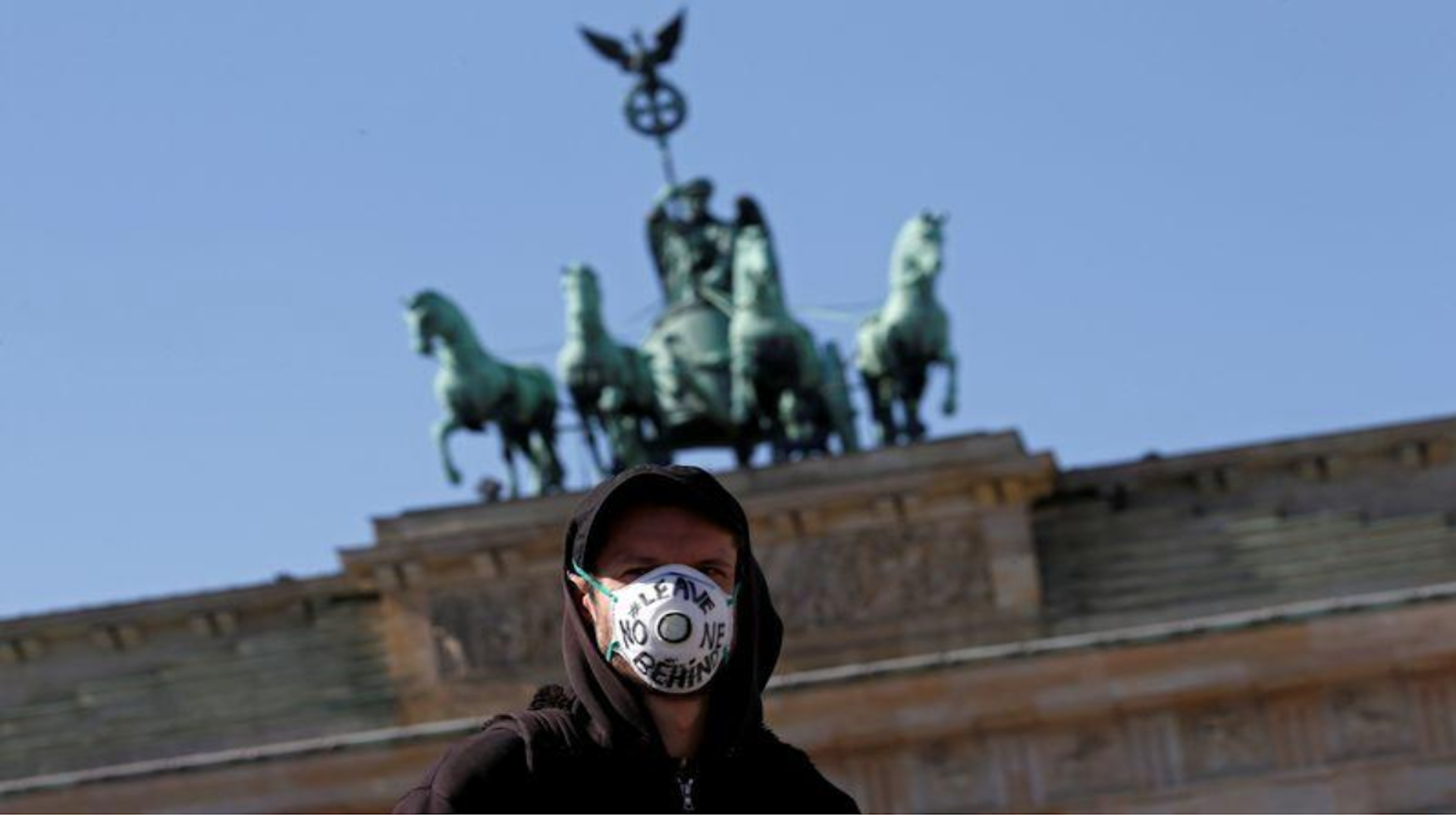The top German scientific academy recommended that the country should introduce requirements for citizens to wear face masks in public to slow the spread of coronavirus.
Head of Leopoldina, the German National Academy of Sciences told Der Spiegel newspaper that every citizen should wear face mask each time social distancing measures can't be respected.
Not everyone, however, is convinced.
A daycare center in the northern city of Hamburg has asked its employees to not wear masks.
According to Germany's Bild newspaper, the city's largest daycare provider "Elbkinder", with 187 locations, 7,000 employees and around 24,000 children, said children should be able to recognize their carers.
Armin Laschet, premier of North-Rhine Westphalia, Germany's most populous state, said he did not currently see a mask requirement for the whole country. But Bavarian State Prime Minister Markus Soeder described the requirement of masks as very likely.

A German police officer wearing a protective face mask approaches car driver at the German-Swiss border after Germany announced border controls, March 16, 2020. /Reuters
A German police officer wearing a protective face mask approaches car driver at the German-Swiss border after Germany announced border controls, March 16, 2020. /Reuters
Coronavirus cases and deaths
According to the latest figures released by the Robert Koch Institute (RKI) for infectious diseases on Tuesday, the number of confirmed COVID-19 cases in the country has risen by 2,082 to 125,098.
The reported deaths have risen by 170 to 2,969.
For about a month, Germany has closed restaurants, bars, schools and banned public gatherings to curb coronavirus contagion across the country.
It has received praise for its handling of the coronavirus crisis. But there has been a lot of debate on the use of face masks as a protection measure.
Several media reports, however, suggest that face masks are not easily available in Germany.

A man wears a face mask during a protest demanding to take refugees from camps affected by the coronavirus disease (COVID-19) outbreak, in front of Brandenburg Gate in Berlin, Germany April 5, 2020. /Reuters
A man wears a face mask during a protest demanding to take refugees from camps affected by the coronavirus disease (COVID-19) outbreak, in front of Brandenburg Gate in Berlin, Germany April 5, 2020. /Reuters
A report by Germany's international broadcaster Deutsche Welle last week said the country is struggling to set up its own national production of face masks despite being a major maker of machines for such masks.
European Centre for Disease Prevention and Control (ECDC) also highlighted the supply situation, saying recommendations on the use of face masks in the community should carefully take into account evidence gaps, the supply situation, and potential negative side effects.
Recommendations for the use of face masks
The RKI now endorses the use of face masks.
If people wear masks even without symptoms as a precautionary measure, this could reduce the risk of transmitting viruses to others, it says.
Rules for coughing and sneezing, hand hygiene and minimum distance should continue to be observed even with masks, the RKI says, adding that there is no sufficient evidence that a mouth and nose protector or a self-stitched mask protects you from infection.

Face masks sewed by workers of the University hospital are seen, as the spread of coronavirus disease (COVID-19) continues in Essen, Germany, March 30, 2020. /Reuters
Face masks sewed by workers of the University hospital are seen, as the spread of coronavirus disease (COVID-19) continues in Essen, Germany, March 30, 2020. /Reuters
In her weekly podcast, German Chancellor Angela Merkel said: "Even if you decide to wear a simple face mask, please remember that it can never replace keeping your distance. As long as there is no vaccine or medication against the virus, keeping the distance is the most effective protection."
A Chinese scientist advised people in Europe and the U.S. to wear face masks in public. Gao Fu, the head of the Chinese Center for Disease Control and Prevention said last month people in the United States and Europe are wrong not to wear face masks in public during the COVID-19 pandemic.
"This virus is transmitted by droplets and close contact," he said in an interview with Science Magazine, one of the world's leading academic journals.
"Droplets play a very important role – you've got to wear a mask, because when you speak, there are always droplets coming out of your mouth."
Only a few EU countries recommend the use of face masks for people going out in public. They include Austria, Bulgaria, the Czech Republic, Lithuania and Poland.
In Germany, the eastern city of Jena was the first in the county to introduce compulsory face masks when traveling on public transport or shopping. It announced the measure at the end of March.